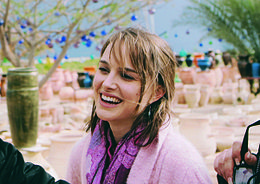Free Zone
| Movie | |||
|---|---|---|---|
| German title | Free Zone | ||
| Original title | Free Zone | ||
| Country of production | Israel , Belgium , France , Spain | ||
| original language | English , Hebrew , Arabic , Spanish | ||
| Publishing year | 2005 | ||
| length | 90 minutes | ||
| Rod | |||
| Director | Amos Gitai | ||
| script | Amos Gitai, Marie-Jose Sanselme |
||
| production |
Nicolas Blanc , Gadi Levy , Michael Tapuah , Laurent Truchot |
||
| music |
Chava Alberstein , Jaroslav Jakubovic |
||
| camera | Laurent Brunet | ||
| cut |
Yann Dedet , Isabelle Ingold |
||
| occupation | |||
| |||
| chronology | |||
| |||
Free Zone is a film drama by Amos Gitai from 2005, produced in international cooperation .
action
The young American Rebecca, who has a Jewish father, sits crying in a taxi driven by the Jewish Hanna Ben Moshe. We later learn that she has just separated from the soldier Julio, who has Spanish and Jewish ancestors.
Hanna wants to go to the area known as the “Free Zone” on the border of Saudi Arabia , Iraq and Jordan to meet a business partner of her husband, who was injured in a terrorist attack. He owes her husband money. Since Rebecca wants to leave Jerusalem, she persuades Hanna to take her with her.
In the Free Zone, the women meet the Palestinian Leila instead of their business partner Samir ("the American"). Hanna tries to get the $ 30,000 owed from Leila. After a long discussion, she agreed to bring the women to Samir. When they arrive in the village where Samir lives, the houses there are on fire. Leila learns from Samir that his son Walid set the houses on fire. The next morning the women try to follow Walid because he supposedly has the money with him. At a checkpoint, Hanna withholds Leila's passport and claims that she has the money with her. While the women are arguing, Rebecca gets out and runs across the border, being followed by police officers.
background
The film was shot in Israel and Jordan . Its production cost was just over a million US dollars . The film grossed approximately $ 236,500 worldwide through July 9, 2006.
Reviews
The lexicon of international films describes Free Zone as "an experimental road movie that reflects the conflict between Israelis and Palestinians from the point of view of women who are struggling with their social roles". The "hypnotic close-up [...] makes a maximum of real contradictions tangible through the sensitive film-language fragmentation".
Desson Thomson wrote in the Washington Post that the film's message was "clear" after ten minutes and would be repeated for the next 80 minutes. The theme song Had Gadia conveys the same message about animals that unnecessarily kill each other.
Jessica Winter wrote in the Village Voice on April 4, 2006 that the film lived off the representations. The characters are "chronically overdrawn" and "stereotyped", which is expressed among other things in the "hackneyed" and "clumsy" lines of dialogue.
Awards
In 2005, the film received four nominations for the Israeli film prize Ophir Award ( Best Actor , Best Actress, Best Supporting Actress, Best Music). Hanna Laslo won in 2005 at the International Film Festival of Cannes the prize as Best Actress , the film was also for the Palme d'Or nomination.
Web links
- Free Zone in the Internet Movie Database (English)
- Free Zone atRotten Tomatoes(English)
- Free Zone at Metacritic (English)
Individual evidence
- ↑ Free Zone locations on imdb.com
- ↑ Entry results from Free Zone on imdb.com
- ↑ Free Zone. In: Lexicon of International Films . Film service , accessed March 2, 2017 .
- ^ Critique by Desson Thomson on washingtonpost.com
- ↑ Review by Jessica Winter on villagevoice.com
